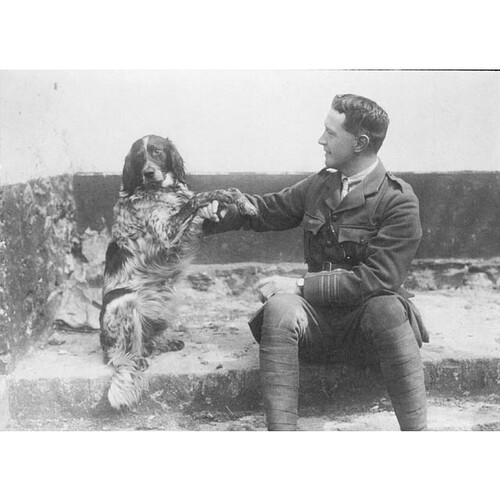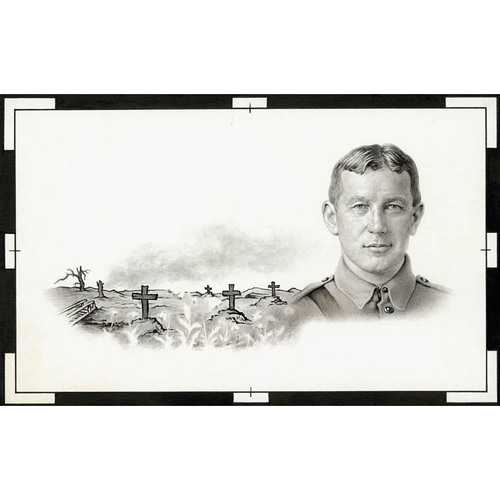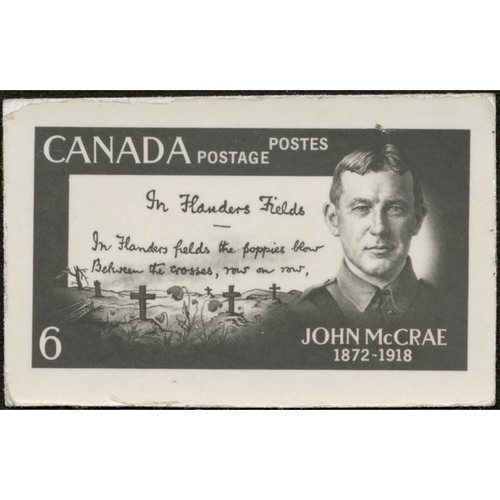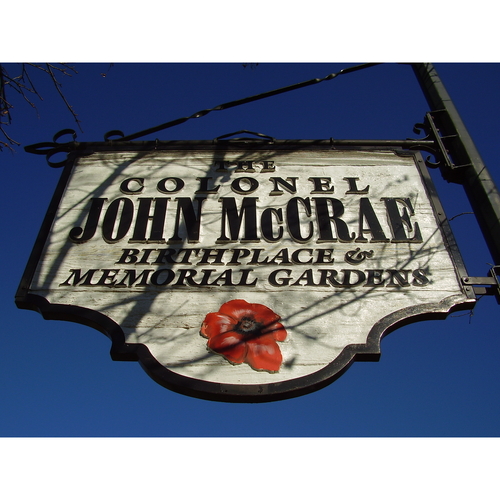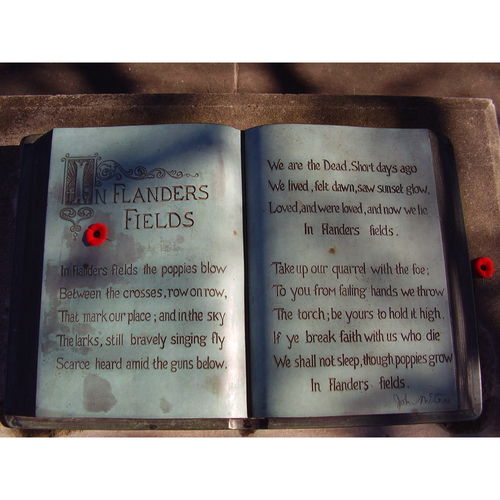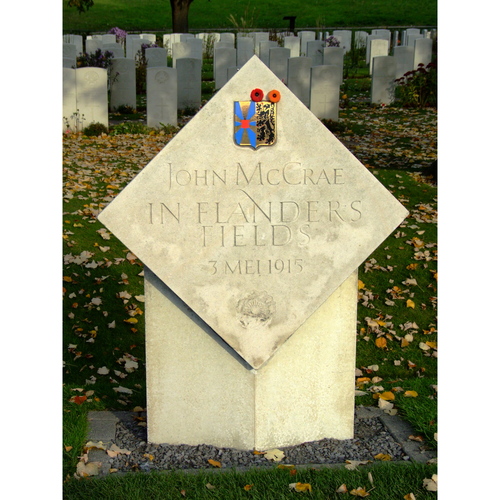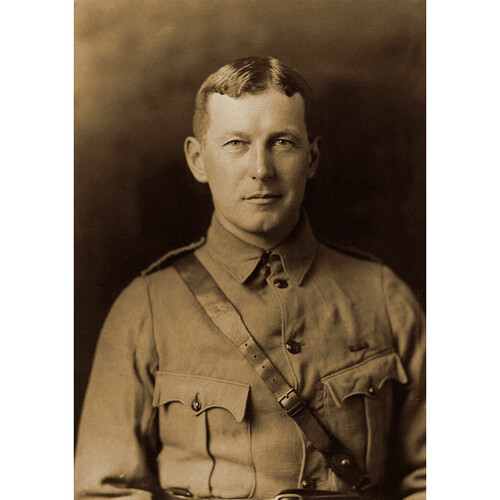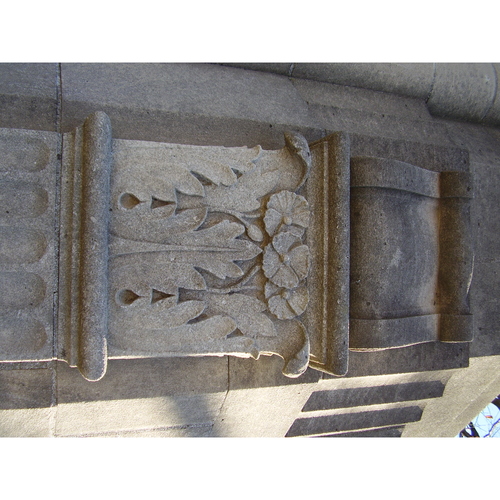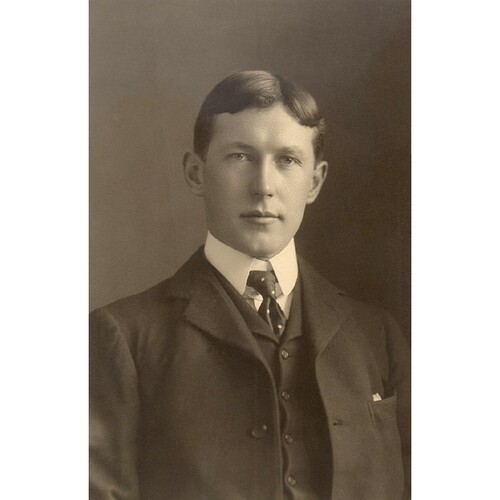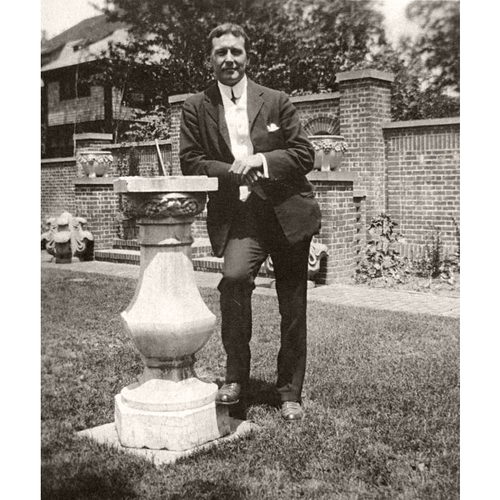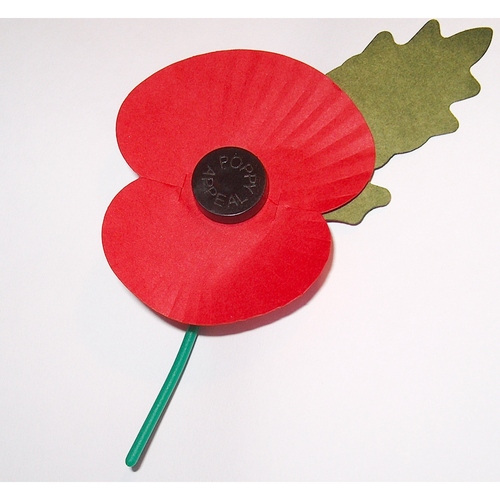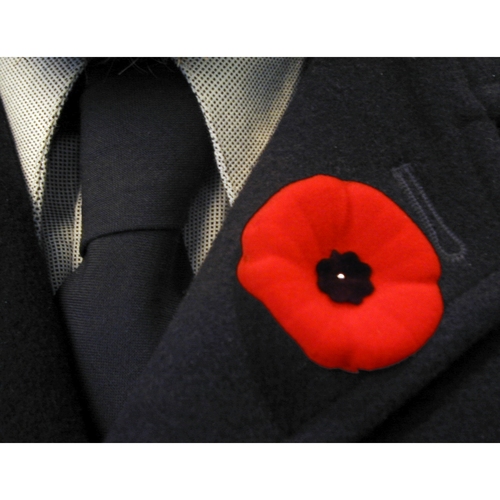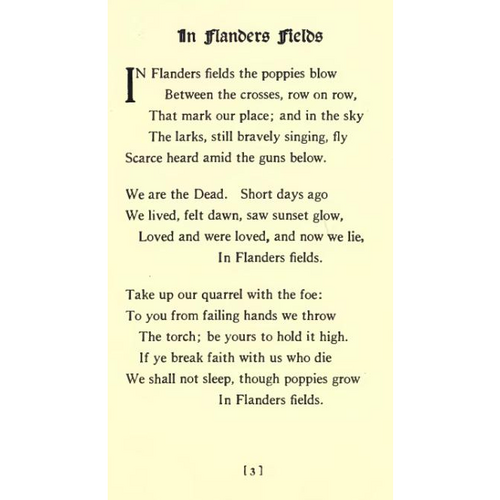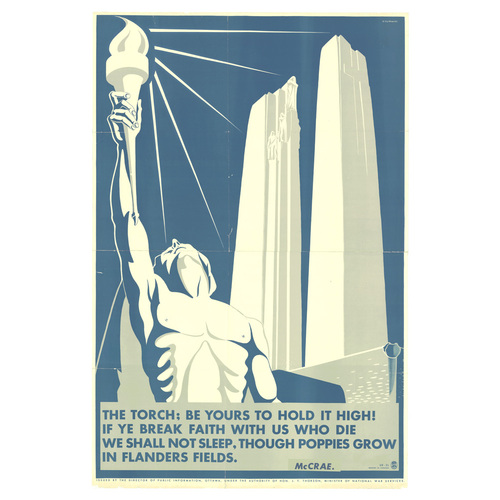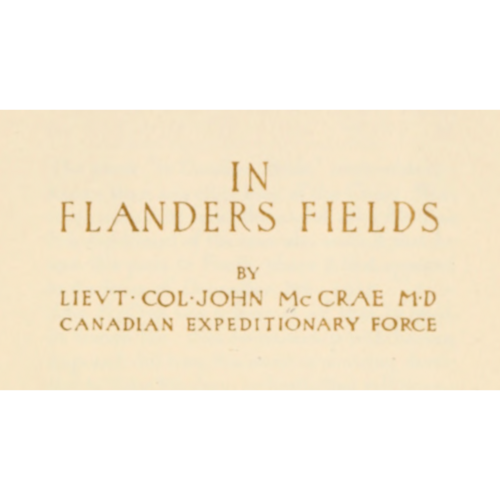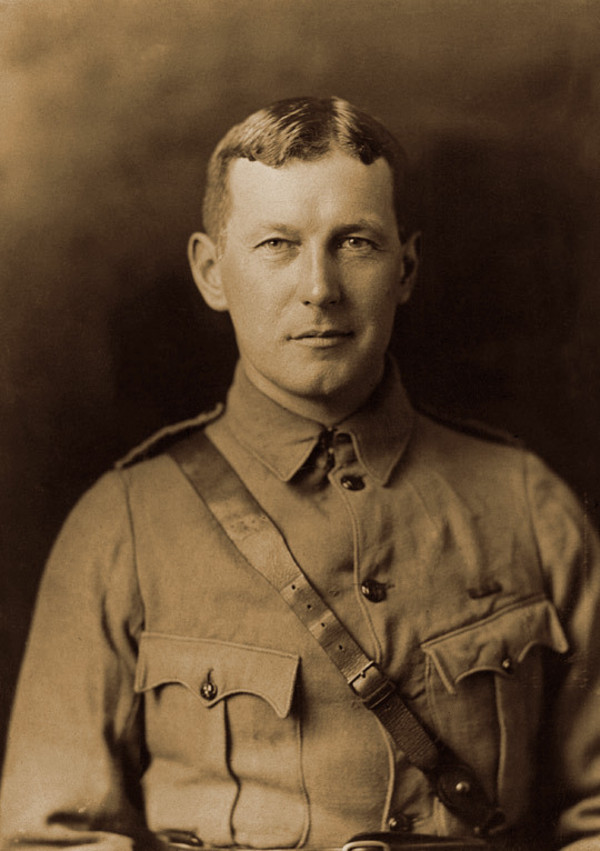
Source: Courtesy of Wikimedia Commons
McCRAE, JOHN, poet, army officer, and physician; b. 30 Nov. 1872 in Guelph, Ont., second son of David McCrae, a woollen manufacturer, and Janet Simpson Eckford; d. unmarried 28 Jan. 1918 in Boulogne, France.
John McCrae, the writer of “In Flanders fields,” the most famous poem of World War I, was a man of many talents, undergirded by the highest standards of loyalty, service, and duty. The grandson of successful Scottish pioneers on both sides of his family, he inherited his father’s passion for soldiering and his pride in the British empire, his mother’s intelligence and sensitivity, and their Presbyterian sense of duty to develop talents in the service of others.
An outstanding medical student, McCrae graduated ba from the University of Toronto in 1894 and md in 1898; the following year he worked briefly as an intern with William Osler at the Johns Hopkins Hospital in Baltimore, Md. His brother Thomas, also a doctor, had become a close colleague of Osler. In 1899 McCrae was granted a fellowship in pathology at McGill University under the supervision of Professor John George Adami. He obtained permission to postpone his studies in order to fight in the South African War. McCrae, who had served in the cadet corps and the militia as a youth, was commissioned a lieutenant in the Royal Canadian Artillery in December 1899. He distinguished himself in South Africa and was a popular officer. His letters to his mother, parts of which were published in the Guelph Evening Mercury while he was on service, give a fascinating account of his wartime experience.
After his return to Montreal in 1901, McCrae soon developed a reputation as an excellent pathologist and he served as resident pathologist at the Montreal General Hospital in 1902, obtaining his licence from the College of Physicians and Surgeons of the Province of Quebec in September of that year. Eventually, however, he devoted himself to clinical work, accepting posts as associate in medicine at the Royal Victoria Hospital in 1904, as physician at the Alexandra Hospital in 1908, and as lecturer in medicine at McGill in 1909. With Adami he wrote A text-book of pathology for students of medicine in 1912.
Described by his friend and mentor Adami as “the most talented physician of his generation,” McCrae became a popular social figure. He belonged to the Pen and Pencil Club, the University Club, the Montreal Military Institute, and St Paul’s Presbyterian Church. His infectious smile, kindliness, charm, and endless repertoire of amusing stories made him a friend of many influential people, including the governor general, Lord Grey, Andrew Macphail*, Stephen Butler Leacock*, and John Macnaughton*, with all of whom he shared the imperialist values characteristic of the period.
McCrae occasionally published poems in the University Magazine, Macphail’s influential vehicle for imperialist thought. He would publish about 30 in various magazines during his life. Many were written while he was in his early twenties, including a number influenced by the tragic death from infection of a girl with whom he was in love. Not surprisingly then, but perhaps also because of his childhood experience with severe asthma, these early poems often had death or the search for oblivion and peace after death as their theme. Later poems tended either to be religious, inspired by the plight of his patients, or to deal with war. His later poems are competent and sensitive, but few in number. The voice from the grave was a common literary device and some poems, particularly “The unconquered dead,” based on his experience in the South African War, clearly presage “In Flanders fields.”
On the outbreak of war in 1914, McCrae used influence with a friend from the South African War, Lieutenant-Colonel Edward Whipple Bancroft Morrison*, to become a major and brigade surgeon (and unofficially second in command) of the 1st Brigade, Canadian Field Artillery, in the Canadian Expeditionary Force. McCrae believed that injustice must be fought, whatever the sacrifice. After fighting at Neuve-Chapelle, France, his brigade was moved in April 1915 to Belgium, to a quiet section in the Ypres (Ieper) salient, which was held by Canadian infantry. On 22 April the Germans made a devastating and unexpected attack on the salient, using deadly chlorine gas for the first time in the war. Half of the brigade died in the subsequent 17 nightmarish days of battle.
The poem for which McCrae is chiefly remembered, “In Flanders fields,” was written while he was waiting for the wounded to arrive at his dugout. It was inspired particularly by the death of his friend Alexis Helmer on 2 May. Published in the London magazine Punch in December 1915, it rapidly became the most popular English-language poem of the war. It caught the mood of a British public horrified by stories of atrocities, the German use of poison gas, the Zeppelin raids, and the German torpedoing of the unarmed passenger liner Lusitania. The poem made McCrae’s name, usually misspelled, known throughout the British empire and later in the United States. The ferocious third verse of the poem was used extensively to further the war effort, including the campaign to bring the United States into the war, as well as in recruiting, raising money, comforting widows, and attacking both pacifists and profiteers:
Take up our quarrel with the foe:
To you from failing hands we throw
The torch; be yours to hold it high.
If ye break faith with us who die
We shall not sleep, though poppies grow
In Flanders fields.
The poem made the poppy the enduring symbol of the war dead of the British empire.
In June 1915 McCrae left the artillery brigade to become lieutenant-colonel in charge of medicine at No.3 Canadian General Hospital, an army hospital in France staffed by friends and colleagues from McGill. Some hardly recognized the exhausted man who joined them, speaking of a drastic change in his temperament as if “an icon had been broken.” Demanding the highest possible standards of service to sick and wounded soldiers, he insisted on living in a tent like his comrades at the front and had to be ordered to the heated huts when the winter badly affected his health. He felt the war intensely, watching its changes reflected daily in the barometer of the many casualties reaching the hospital.
By late 1917, after the disaster of Passchendaele (Passendale), Belgium, and the collapse of the Russians, the morale of the British army was at its lowest point. It was widely thought either that the war would go on for decades or that the Germans might win. Early in 1918 a friend described McCrae as “silent, asthmatic, moody.” On 24 Jan. 1918 he was appointed consulting physician to the 1st British army, the first Canadian to be so honoured. He did not live to appreciate the distinction; four days later he died of pneumonia and meningitis. He was buried with full military honours in the cemetery at Wimereux, France. He would have broken faith had he lived while so many died.
John McCrae published a number of reports in various medical journals, and, with J. G. Adami, prepared A text-book of pathology for students of medicine (Philadelphia and New York, 1912; 2nd ed., 1914). Microfilm copies of his correspondence with his family can be found in NA, MG 30, D209. Excerpts from the letters written to his mother during the South African War were published in the Evening Mercury (Guelph, Ont.) between January and December 1900. McCrae’s poems originally appeared in literary magazines; the most complete collection was issued posthumously as In Flanders fields and other poems (Toronto and New York, 1919) and includes a biographical sketch by Sir Andrew Macphail entitled “An essay in character.” A full-length biography with a comprehensive list of sources is provided in the author’s study, In Flanders fields: the story of John McCrae (Erin, Ont., 1985).
John McCrae’s poem “In Flanders fields” and the French adaptation by Jean Pariseau, “Au champ d’honneur,” are engraved on marble plaques in the Memorial Chamber of the Peace Tower, Ottawa.
A. E. Byerly, The McCraes of Guelph (Elora, Ont., 1932). D. S. Lewis, Royal Victoria Hospital, 1887–1947 (Montreal, 1969). H. E. MacDermot, A history of the Montreal General Hospital (Montreal, 1950). No.3 Canadian General Hospital (McGill), 1914–1919, ed. R. C. Fetherstonhaugh (Montreal, 1928).
Cite This Article
John F. Prescott, “McCRAE, JOHN,” in Dictionary of Canadian Biography, vol. 14, University of Toronto/Université Laval, 2003–, accessed March 1, 2026, https://www.biographi.ca/en/bio/mccrae_john_14E.html.
The citation above shows the format for footnotes and endnotes according to the Chicago manual of style (16th edition). Information to be used in other citation formats:
| Permalink: | https://www.biographi.ca/en/bio/mccrae_john_14E.html |
| Author of Article: | John F. Prescott |
| Title of Article: | McCRAE, JOHN |
| Publication Name: | Dictionary of Canadian Biography, vol. 14 |
| Publisher: | University of Toronto/Université Laval |
| Year of publication: | 1998 |
| Year of revision: | 1998 |
| Access Date: | March 1, 2026 |


